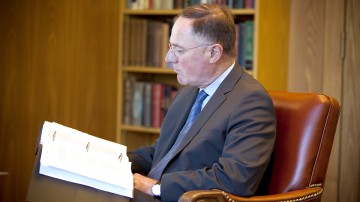B.C. gets new chief justice

Harper appoints Robert Bauman to replace Donald Brenner at the B.C. Supreme Court; best known for role in third murder trial of Kelly Ellard
Robert Matas
From Friday's Globe and Mail
September 11, 2009
“Unless you know the personalities and know who else might have been considered in that jurisdiction, there is no way for judging whether these appointments are appropriate,” federal NDP justice critic Joe Comartin said yesterday in an interview.
“For the vast majority of the public, they do not know the personalities or qualifications of individual judges sitting on that bench,” he said, “so there is no way for the public to be able to judge this.”
Prime Minister Stephen Harper issued a news release early yesterday morning announcing that Robert Bauman, an appeal court judge who served previously as a judge on the B.C. Supreme Court, would replace former chief justice Donald Brenner. The position became vacant after Mr. Brenner announced in May that he decided to resign after 17 years as a judge.
Mr. Brenner, who was appointed chief justice in 2000 by former Liberal prime minister Jean Chrétien, said yesterday he anticipated British Columbians would not detect any differences as a result of the appointment by the federal Conservative government.
“I do not think there ever was such a thing as a Brenner court,” Mr. Brenner said in an interview. “I am very pleased and delighted with the Prime Minister's election of Chief Justice Bauman. I think he will be an outstanding chief justice. The work of the court will continue and it will continue very well indeed under his most capable leadership.”
The new appointee was a trial judge for eight years on the Supreme Court while Mr. Brenner served as chief justice. Mr. Brenner called his successor “a wonderful colleague” who worked hard as a judge and as a member of internal court committees. “He's very well positioned by background and experience to take this on.”
Mr. Brenner also said he was not a big fan of public hearings on judicial appointments. A judge's personal views are irrelevant, he said. “Of course, everyone comes to a job with a background and views and opinions, but as a judge, you check those at the courtroom door.”
Mr. Comartin said managerial skills are among the top requirements for the job. “Without demeaning the importance of a judge having a good basis in jurisprudence, what you want that person to do is manage the court as efficiently as possible,” he said.
“What I have been worried about is that, given the orientation of this government to introduce more right-wing ideology into courts, they might pick people who do not have those managerial skills and were viewed as more ideologically right wing.”
Mr. Comartin said the appointments should be made after a review by a committee of representatives from the law societies, bar associations, law schools and parliamentarians. The committee would evaluate judges on the basis of criteria that are publicly known, he said.
“The committee would say, we reviewed the criteria and qualifications of this candidate and this person best meets the criteria,” he said. “The decision is now totally a behind-the-scenes process.”
Chief Justice Bauman said he does not have a view on whether public hearings should be held on judicial appointments. “I've been watching the evolution of that issue to date with interest, but I don't have a view on that,” he said in an interview.
He did not apply for the job, he also said. He was caught by surprise when staff from the federal Justice Department called him a few days ago to see whether he would let his name stand on a short list for the position. “It is one of the jobs that is difficult but you think hard before saying no to the challenge,” Chief Justice Bauman said.
Commentary by the Ottawa Mens Centre
The fact, that Mr. Harper, can decide for Canadians, with the snap of his
fingers, who will be the next chief justice of B.C. is disturbing. His choice
may well be and apparently is an excellent one, despite the allegations of
conservative connections. If connections ruled out a candidate, a very large
number of judges would not be eligible, and those connections, just may be
evidence of a desire to do something positive not negative for Canada.
The problem is, that many of Canada's Superior court judges are, blatant
political appointments, and without any real screening, the sort of screening
that any responsible organization would use.
What is not used is a background check or a psychological assessment.
Fact is, many judges are the WRONG sort of personality to be entrusted with
absolute power. There is no probationary period, you never hear of a judge not
making the grade when that is exactly what should happen when a new judge starts
demonstrating a propensity to flagrantly abuse their power.
Ottawa has a small number of judges who qualify as the "underbelly of the
judiciary" and that's being polite and diplomatic.
That being said, Ottawa has, probably the highest number of superior court
judges who will "flagrantly" abuse their power, and they leave a trail
destruction not to mention, bring into ill-repute, the reputation of the saints
of the judiciary that the public never hear about.
There are many judges, who never come to attention who frequently work into the
late hours and never really get any recognition. Its a tragic reality that the
few totally unsuitable judges who are renown by their nicknames such as "the
worst judge ever" get to damage the reputation of the entire judiciary.
The worst judges in Canada are very well known and no one it appears, in the
entire system, even Mr. Harper, is willing to do anything about getting rid of
them.
www.OttawaMensCentre.com